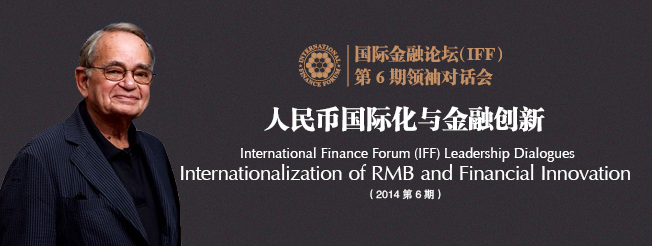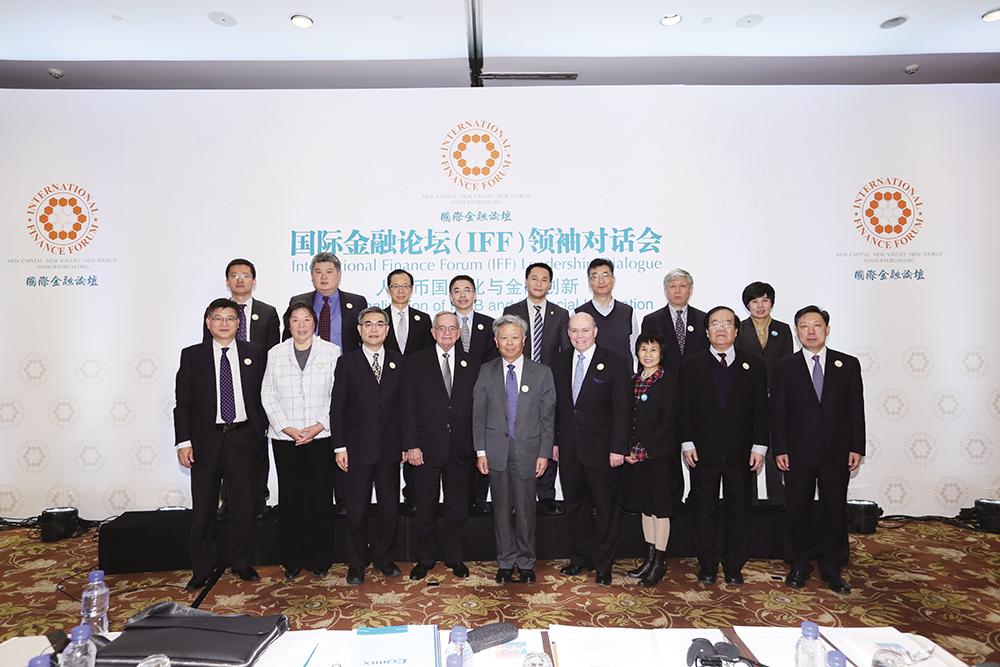IFF 6th Leadership Dialogue:
Internationalization of RMB and Financial Innovation
AUTHOR:IFF
FROM:IFF
TIME:2014-11-13

On November 12, 2014, the International Finance Forum (IFF) 6th Leadership Dialogue was held in Beijing. As co-founder of IFF, vice chairman of IFF Advisory Committee and Chairman Emeritus of CME Group, Mr. Leo Melamed made keynote speech, sharing his insights on RMB internationalization and the historical opportunities and challenges confronting China. He particularly gave his experience of "the decisive effect of market on price" he learned from his father, which then became his lifelong principle.
On this four-hour dialogue, about twenty top experts from government, academic and business spheres exchanged their thoughts on the internationalization of RMB and financial innovation. Mr. Jin Liqun, the executive vice president of IFF and secretary general of the Multilateral Interim Secretariat for Establishing Asian Infrastructure Investment Bank (AIIB), presided over the first session: "Internationalization of RMB and Development of Global Monetary Market". Mr. Jin believed that " jump in the sea" is the due attitude for China now. Mr. Xiao Geng, the executive member of IFF Academic Committee and Honorary Professor of University of Hong Kong hosted the second session: "Internationalization of RMB and Financial Innovation", which aroused heated discussion over financial innovation and risk among the experts.
Agenda
2Highlighted by the China-Russia Currency Swap Agreement of 150 billion completed on October 13, China makes significant progress in RMB internationalization. Since late 2008, PBoC has signed five bilateral currency swap agreements with over 20 monetary authorities around the world. In 2014, China further expedites the deployment of global network of RMB clearing services, signing five new memoranda of cooperation.
Through the dialogue among well-established national and international experts about potential impacts on global monetary market imposed by RMB internationalization and the changing strategic gaming among major market players, we examine the strategic impacts of RMB internationalization and China's efforts to reach a global consensus on this matter.
With advancement of RMB internationalization, RMB gains wide attention on its new roles as the international trade, clearing and reserve currency. Thereby RMB-denominated financial instruments such as the offshore RMB trading, oil futures denominated in RMB, etc., also attract wide interests. Focusing on the innovation of financial instruments, we initiate an in-depth conversation on the new investment opportunities with a practical perspective.
Keynote Speeches

By profession I am a lawyer. What knowledge I did attain about economics was achieved in a practical way, as a trader and by building markets around the world. Oh, and by spending time with some great economists such as Milton Friedman, Merton Miller, Myron Scholes and China's own Cheng Siwei. Accordingly, to present a paper about the internalization of the RMB, I have leaned heavily on what I have learned from the people I have just named as well as some specific papers written by group of experts: Aite, an independent research and advisory firm, the ADB Institute, a paper by Barry Eichengreen and Masahiro Kawai of the Asian Development Bank, SWIFT, The Society for Worldwide Interbank Financial Telecommunication, China Briefing News, the Peterson Institute for International Economics, and The Council on Foreign Relations.
The idea of the renminbi becoming a reserve currency thereby replacing the dollar or the euro has been under discussion for a number of years. Of course to do so, free convertibility of the RMB would first be required. This is a hotly debated subject among financial experts and academics around the world. In China, without officially announcing a time table, Chinese officials have increasingly moved to encourage a limited application of usage for the RMB in international transactions. In fact, international use of the RMB is clearly a stated goal within China's announced reform strategy.
As defined by Peter Kenen, "An international currency is one that is used and held beyond the borders of the issuing country, not merely for transactions with that country's residents, but also, and importantly, for transactions between non-residents." The internationalization of a currency can be defined as having three stages: First, as a global trade and payments currency; Second, as a global investment currency; and third, by becoming a global reserve currency. The RMB gets some good marks with respect to the first two stages through a process of gradual liberalization guided by the PBOC. Its achievement is evident within the realm of trade finance, payments, and investment.
Viewpoints

The only way to determine value is though the market. A deeply-opening and well-regulated capital market maintains necessary for RMB internationalization and financial innovation. Financial futures play an important role in constructing the capital market. The financial crisis happened in 1987 and 2008 prove that a successful market of financial futures can effectively buffer the pressure imposed by economic decay and market failure. And a key determinant to a robust financial futures market or even the whole capital market lies in a fully-developed legal system, which providing full-scale protection on intellectual property rights.

What we need to discuss now is not the percentage of appreciation should RMB have, but the pricing mechanism. I think the impact back on the domestic policies of countries, which is really the origin of global financial vulnerability, has been more important than the Breton woods Institutions. It is natural that dominant creditors want transactions denominated internationally, increasingly on its own currency. But any large holder of dollar reserves would sense the vulnerability of the size of the dollar reserves if it anticipates in long-term bases, that monetary authority has to push off the cost of depreciation.
The RMB internationalization needs a liquid capital market. The reason why US dollar, Japanese yen and Deutsche mark can become reserve currency is because the pressure from international market and the reform in their domestic capital market. Reforms in capital market include and capital control. Unless there is fundamental reform on China's domestic capital market including interest rate as well as capital control and exchange rate, can RMB internationalization be realized completely. Right now, people overlook the reform in domestic capital market and focus too much on the objective of RMB internationalization.

Convertibility is very important for RMB internationalization. We need to take bold actions to accelerate this process. To better cooperate with neighbor countries and contribute to Asia-Pacific as well as other economies, we need to demonstrate the world of the liquidity and openness of China’s market. Chinese market allows capital inflows as well as outflows, even during crisis. We hope to reform our market of futures and improve the quality of our financial instruments.

Convertibility is very important for RMB internationalization. We need to take bold actions to accelerate this process. To better cooperate with neighbor countries and contribute to Asia-Pacific as well as other economies, we need to demonstrate the world of the liquidity and openness of China’s market. Chinese market allows capital inflows as well as outflows, even during crisis. We hope to reform our market of futures and improve the quality of our financial instruments.
The free cross-board flow of RMB decides the free convertibility between RMB and other currencies. Specific measures could be taken to tackle this issue, including: promoting Internet economy, enhancing global financial influence, bridging domestic and global markets, improving the quality of domestic capital market, and utilizing the multilateral mechanisms like APEC.

Governments overemphasize the post-crisis downward risks, while underestimating the upward returns. This leads to over protection on domestic banking system, which further deteriorates Chinese banking system's capacity of risk management. A financial market being well-operated and regulated is able to absorb and mitigate risks, which runs based on commercial demands.

Borrowing thoughts from the internationalization of Japanese Yen, the efforts of RMB Internationalization encompass four tasks:
1), How to change the late-starting disadvantages into late-starting advantages;
2), How to transfer from the level of meeting market demand for RMB to the level of creating demand;
3), How to develop from merchandise trade to financial trade, and;
4), How to upgrade RMB from investment currency to funding currency.
And four commissions right follows these tasks:
1), Continue promoting the internationalization of banks;
2), Establish onshore and offshore RMB settlement system;
3), Continue promoting establishment and development of international policy banks like AIIB, and;
4), Make use of the legacy stemmed from Alibaba and other Internet enterprises on raising capital from overseas markets.

There is such a fact: we purchase US Treasury Bonds with rate of almost zero, then American companies invest in China with a ROE of almost 10%. Actually, China has been being arbitraged, and it is carry trade based on capability. Financial derivatives means much more than futures. We need to be extremely cautious about the additional risks underlying the complicated trade of financial derivatives. And market participants need education to be capable of efficiently using these financial instruments.
Chinese government is right pursuing this progressive way to reach a liberalized capital market. As for RMB internationalization, I would rather to say it is actually a global economy being RMB-nized. It is true that RMB does not play a role as important as other SDR currencies, but we do see an increase in the usage of RMB in more and more international trade.

The internationalization of a currency reflects not only the economic aggregate of an economy, but her weight in the global market. Convertibility of RMB is the prerequisites to its complete internationalization. It is true that RMB has become a very important investment currency, but its market share is not large enough. Therefore, we need to create market demands, which would automatically channel China's investment to other markets. Economic aggregate can be increased within short term through intensive accumulation of investment and capital. However, it takes much longer time to construct a global market and become a reliable player on the market. A good market place requires good institutional facilities and experiential knowledge. Although some of these elements seems much isolated from financial sector, say the infrastructure of medical care and education services, their availability still determines the success of making a global financial center.

According to field research conducted in southeast costal provinces and invoice data of merchandise trade, only less than one fifth of the local companies use RMB as settlement currency. So there might be bubbles in previous official statistics.
Now China is experiencing structural transformation of the economy, particularly slow economic growth, painful structural adjustment and decaying stimulating policies coexist. It is risky to expedite the pace of capital market liberalization. And this is supposed to trigger financial crisis in China due to the huge capital outflow caused by over-liberalized capital market.
Therefore, the internationalization of RMB and liberalization of capital account should advance in a progressive way. While conducting domestic economic structural reform, we can make attempts in indexation of some financial index like interest rate of RMB, set reform timetable, and gradually realize the internationalization of RMB and liberalization of capital account.

APEC Summit has just concluded. It is seen that China's role has transferred from a follower to a promoter. Since RMB Internationalization has started, China needs to be bold in making the market decide currency value.
Besides, I think RMB need to be used as unit of measurement to measure the amount of economic and trade activities. I hope that AIIB, to some extents, can use RMB on its balance sheet. At the same time, if global investors have viewed RMB as one of the reserve currencies, we need to discuss the RMB Internationalization prior to the complete availability of a mature domestic capital market. The national bond markets have been absorbing investment of foreign exchange reserve, but China’s national bond market remains very undeveloped. I expect IFF could advocate the proposals of enhancing treasury market, decreasing the level of required reserve ratio, and enhancing interest rate liberalization.